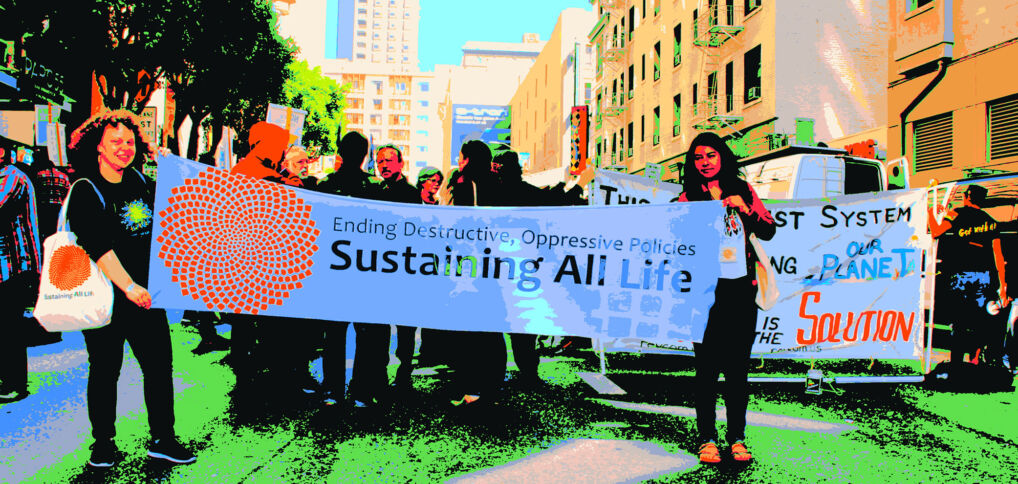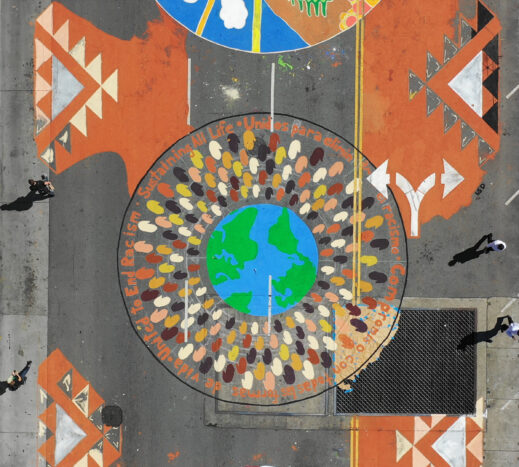
View this resource
as a PDF >>
****
View this resource
in French>>
****
View this resource
in Spanish>>
Capitalism, the world’s dominant economic system for the past 250 years, has proven itself to be incompatible with human well-being and sustaining the environment. This has become glaringly obvious in the last decade. Capitalism’s drive for constant growth—through overconsumption and exploitation of natural and human resources—has created the climate emergency.
Capitalism organizes societies to extract maximum profit for the owners and managers of resources and wealth—without concern for the future of life on Earth. This system is not natural or inevitable—capitalism had a beginning and it will have an end.
However, to solve the climate emergency, we need to speed up the end of capitalism. We need to replace capitalism with an economic system that can provide for the basic needs of all humans while protecting the natural environment and its ability to sustain life on Earth. Our connections with each other and with the environment need to be central to this new system. It needs to replace individualism and the exploitation of people and natural resources to create profits for a few. With a humane and sustainable post-capitalist economy it will be possible to eliminate all forms of oppression as well as sustain all life on Earth.
Replacing capitalism with a fair and sustainable economic system is an enormous challenge. But capitalism itself came into being only a few hundred years ago. It replaced economic systems that were as dominant in their times as capitalism is today—slavery and feudalism. Capitalism functioned alongside these older systems for some time. However, it didn’t actually become dominant until the old ways of doing things—the old ways of thinking and feeling—had been replaced by the logic of capitalism.

Internalized capitalism
Several generations later, we have accepted many ways of thinking and feeling that reflect the logic of capitalism: beliefs, values, and attitudes that justify the capitalist mode of production and consumption. They limit our thinking and undermine our ability to create a more humane and sustainable economic system.
Examples of these “internalized attitudes of capitalism” include the following:
• The Earth belongs to us. We can take from it endlessly without regard for humans and other life forms. We are entitled to whatever the Earth produces.
• Capitalism is the only economic system that makes sense; it is the best system possible, and there is no other sensible option.
• Everything can be bought and sold. It is acceptable to commodify everything—land, food, water, health, sex, education, information, human life, animal life.
• Economic inequality and greed are part of human nature.
• Accumulating endless wealth is rational.
• Consumption can make people happy (less scared, less bad) and more desirable.
• More is better. Having more than you actually need is a sign of success and will bring security.
• One’s value as a human being is measured by one’s material wealth.
• Meritocracy—anyone can be “successful” through hard work and intelligence; if you have not been successful, then it means that either you have not worked hard enough or that you are not smart enough. In other words, it’s your individual failure if you are not “successful.”
• If “getting ahead” means competing with and defeating others, that is okay. Leaving others behind is acceptable as long as one is taking care of one’s self and one’s family.
• Oppression (racism, sexism, and so on) is an inevitable and acceptable consequence of the profit system.
• It is okay to exploit people and take advantage of their vulnerability.
• What is mine is mine—personal ownership is highly valued (in many Indigenous cultures there is no concept of personal property).
• Seek all kinds of distractions to avoid facing reality;
• Care first and foremost about oneself—individualism reigns. It is okay to be indifferent to the needs of others.
• Those who are wealthy are natural leaders.
• Colonization, imperialism, genocide, and war are acceptable means of getting ahead.
• Wealthy capitalist nations can dominate and rule poor nations.
• Anyone or any institution that questions capitalism is dangerous.
These ideas and assumptions are not our own rational thinking. They are justifications for the current oppressive system. Every child growing up under capitalism is bombarded with them and pressured to accept them. We inevitably and unconsciously internalize them. They masquerade as “human nature” when they are nothing more than capitalist ways of thinking and feeling.
Internalized attitudes of capitalism have harmed us emotionally. We may feel alone and bad, disconnected from other people and other forms of life, superior or inferior to other people, hopeless about change, grief stricken, scared, and powerless to change inhumane conditions.
Overcoming internalized capitalism

We want rational thinking and good decisions for ourselves, for the good of other people, and for the good of the planet. We can help each other rid ourselves of these internalized attitudes that limit our thinking and activism. Then we can more successfully address the climate emergency and the transition to a new economy.
As a starting point, we can examine everything that we take for granted about the capitalist economic system. Do the assumptions listed above really reflect “human nature”? Do they reflect a rational way of organizing ourselves and the systems of production and consumption?
We can counter these oppressive assumptions by offering a perspective outside the logic of capitalism. For example, we can replace the concept of exploitation and domination with cooperation and mutual assistance. The following ideas challenge usual ways of thinking and acting under capitalism:
• Enough is enough—how much do we really need for our lives to go well? We can distinguish between wants promoted by capitalism and its advertising, and our real needs. We can consider cutting our consumption in half—what would you have to feel if you were to do this?
• Every human being, every human mind, is equally valuable and is equally deserving of caring and access to resources.
• It is the capitalist economic system that is responsible for systemic poverty—it is not anyone’s individual fault.
• Economic inequality does not make sense. It is natural to feel heartbroken and to grieve about it. It is appropriate to be outraged and furious about the massive unequal distribution of resources.
• There is enough to meet everyone’s needs. With cooperation, everyone succeeds. There are no “losers.” There are no inherent conflicts among humans.
• What is mine is yours and what is yours is mine—what would it look like to live this decision? How would you feel if there was no such thing as private property and personal possessions?
• Give up all forms of distractions—including addictions to always acquiring more and to running away from your emotions. We can face our uncertainties and fears and not rely on the pseudo-security promised by consumerism.
• Notice that we are actively and unavoidably involved with the capitalist system, that every purchase makes profits for the owning class.
• Work to eliminate all forms of humans harming humans. Act on the belief that everyone is your potential ally and that you can be an ally to everyone. Refuse to be divided from other people.
• Promote the leadership of young people, Native and Indigenous and Global Majority people 1, poor and working-class people, women, and people from the Global South.
• Connect with the earth on a daily basis. Notice the air, the water, the wind, the trees.
• Consider that there are alternatives to capitalism that would improve the lives of all people.
• Reclaim play, joy, and happiness.
• Care deeply. Love people. Love the earth. Caring is the antidote to indifference. When in doubt, choose to care.
• Consider opposing wars and standing with every human. There are no human enemies.
• If ever in doubt, choose to unite the human race and to sustain all life.
Healing from the internalized attitudes of capitalism
As we fully understand the extent to which we have internalized capitalist messages, and how oppressive that mindset is, we will likely uncover deep hurts. As we heal from these hurts, as we heal from internalized capitalism, we will think more creatively and rationally about our economic system and the climate emergency and act more powerfully.
1The peoples of Africa, Asia, the Pacific Islands, the Caribbean, and Latin America, and those descended from them, are over eighty percent of the global population. These people also occupy most of the global land mass. Using the term “Global Majority (GM)” for these people
acknowledges their majority status in the world and interrupts how the dominant (U.S. and European) culture assigns them a minority status.
Many Global Majority people living in dominant-culture countries have been assimilated into the dominant culture—by force, in order to survive, in seeking a better life for themselves and their families, or in pursuing the economic, political, or other inclusion of their communities. Calling these people “Global Majority” contradicts the assimilation.


